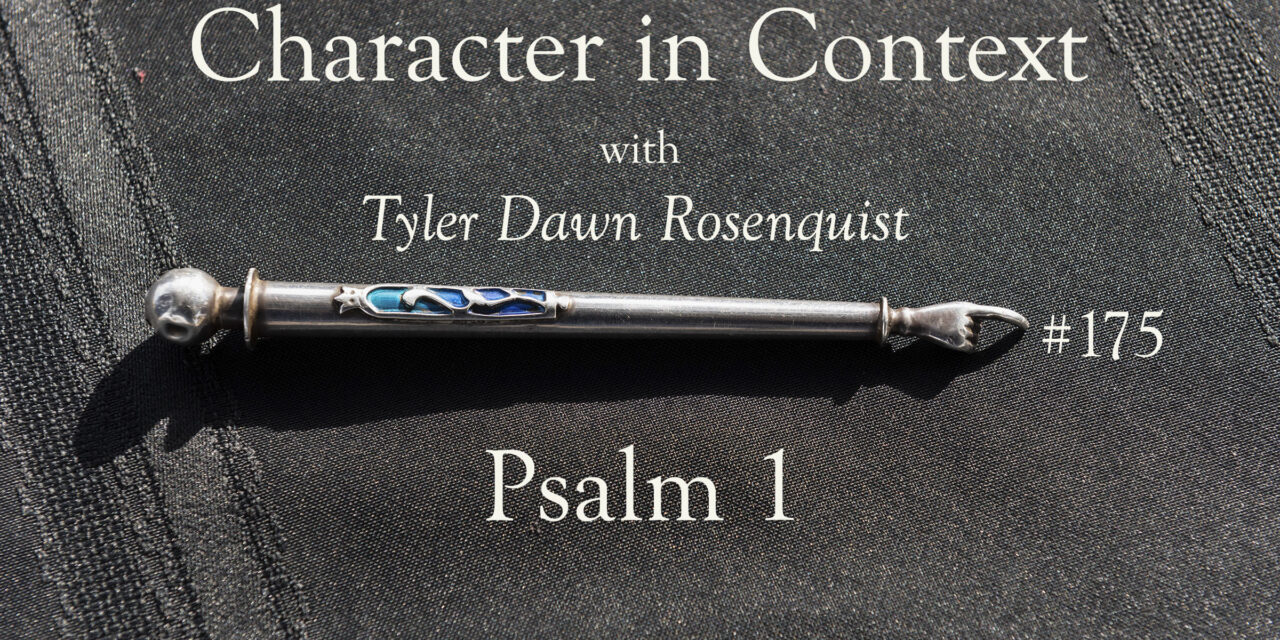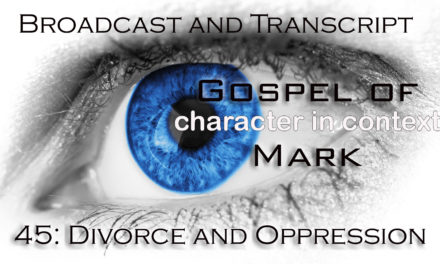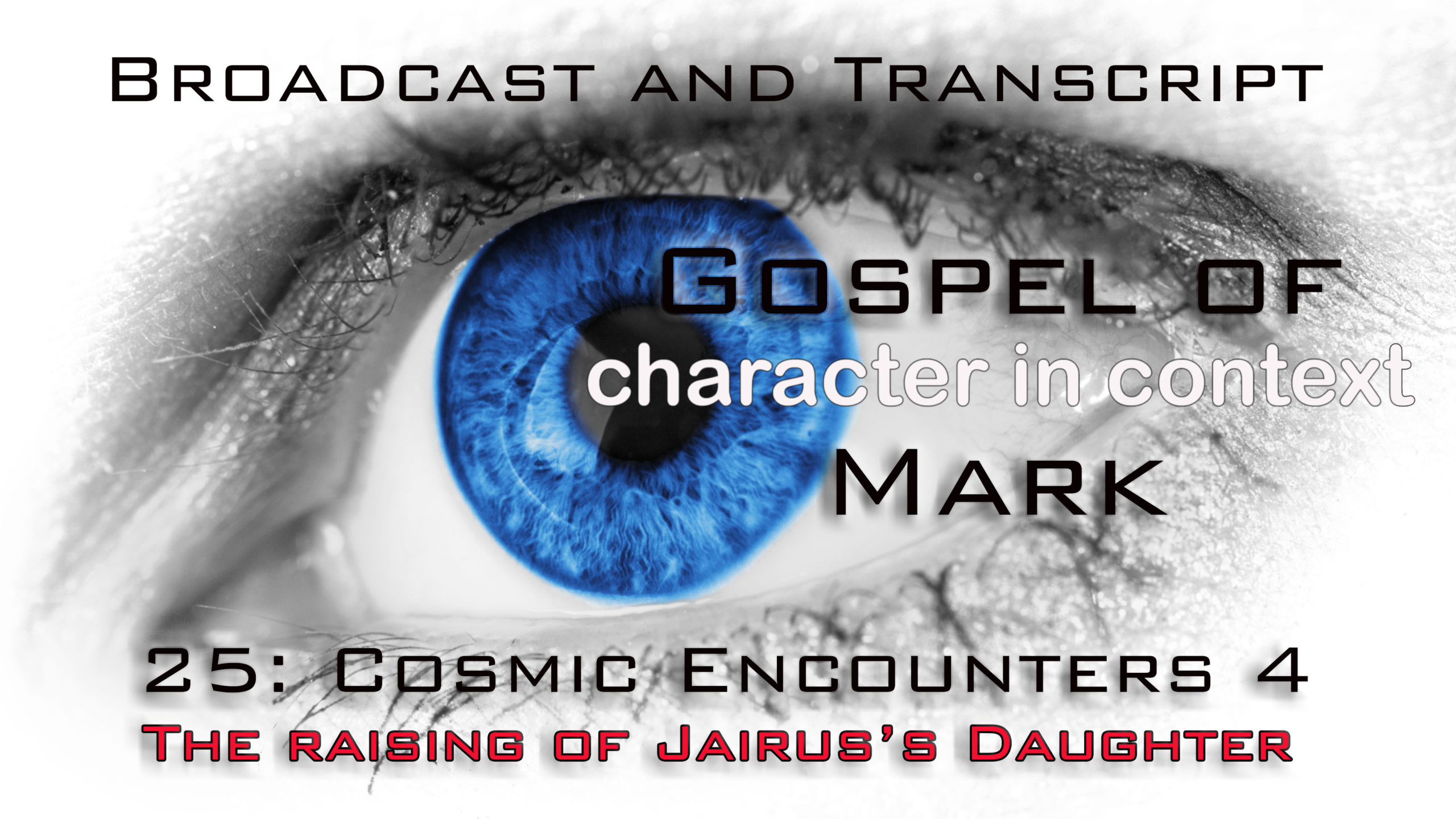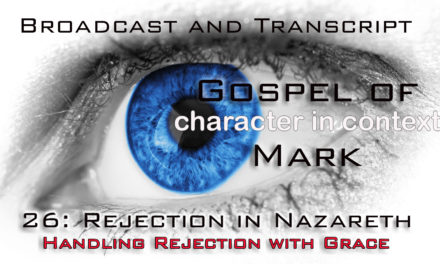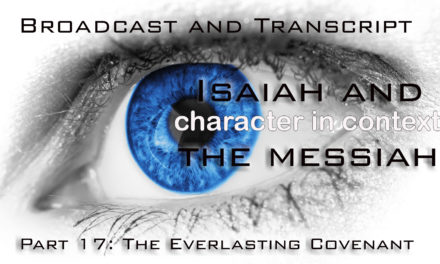This is the beginning of a new series exploring the Psalms. I am going to alternate between the Psalms and the Gospel of Matthew because knowing the Psalms will help with understanding this Gospel and Yeshua’s/Jesus’s role as the Greater Moses as well as the Greater David. It won’t be obvious at first, but after a while it really will begin to make sense.
(My affiliate links for Amazon products are included in the post. As an Amazon Associate, I earn from qualifying purchases.)
If you prefer to use YouTube, here is the link for that. If you cannot see the podcast player, click here.
This post contains affiliate links.
Hey, there, I am starting two brand new series, and I will go back and forth every four episodes doing four Psalms and then four teachings on the Gospel of Matthew. Matthew presents Yeshua/Jesus differently from Mark, who shows us the Yahweh-Warrior battling demonic forces. Matthew tells a different story of Yeshua as the Greater Moses, Israel’s definitive teacher, and authority on the will of God and the radical life we are called to live. As such, the Psalms and Matthew work together because they are some of the theologically densest texts in the canon. And one will definitely help us understand the other—going in both directions, actually. I really want you to get a handle on how to read them not simply as prose (narratives like the Gospels) and poetry (the Psalms) but as interlocking pieces of wisdom literature designed to teach us how to live in relationship to God and as image-bearing citizens of the Kingdom of Heaven. I will post a master book list sometime soon if you want to know what resources I am using for this series.
Hi, I am Tyler Dawn Rosenquist, and welcome to Character in Context, where I teach the historical and ancient sociological context of Scripture with an eye to developing the character of the Messiah. If you prefer written material, I have years’ worth of blogs at theancientbridge.com as well as my six books available on Amazon—including a four-volume curriculum series dedicated to teaching Scriptural context in a way that even kids can understand it, called Context for Kids (affiliate link). I also have two video channels on YouTube with free Bible teachings for adults and kids. You can find the links for those on my website. Past broadcasts of this program can be found at characterincontext.podbean.com, and transcripts for most broadcasts at theancientbridge.com. If you have kids, I also have a weekly broadcast where I teach them Bible context in a way that shows them why they can trust God and how He wants to have a relationship with them through the Messiah.
We’re going to switch things up on the Scripture quotations—the Psalm itself will be read initially from Robert Alter’s excellent The Book of Psalms: A Translation with Commentary (affiliate link). After that, I will pull all Scripture from the Christian Standard Bible (CSB). Alter is famous for his translations, which capture more of the flow and the brevity of the Hebrew—as opposed to most English translations, that make a seven-word verse into a seventeen-word verse simply to make it more appealing and beautiful to us. And there is nothing inherently wrong with that, but hearing them this way is meaningful too.
Happy the man who has not walked in the wicked’s counsel, nor in the way of offenders has stood, nor in the session of scoffers has sat. But the LORD’s teaching is his desire, and His teaching he murmurs day and night. And he shall be like a tree planted by streams of water, that bears its fruit in its season, and its leaf does not wither— and in all that he does he prospers. Not so the wicked, but like chaff that the wind drives away. Therefore the wicked will not stand up in judgment, nor offenders in the band of the righteous. For the LORD embraces the way of the righteous, and the way of the wicked is lost. (Alter, pg. 43)
Isn’t it interesting that the Psalms not only start with a Beatitude (like the Sermon on the Mount, hint-hint—a huge tie-in with Matthew), but it’s also a Proverb—and beyond that, some scholars believe that Psalms 1 and 2 are meant to be read together as a picture of the sort of king that Yahweh desires—one who refuses to listen to or consort with evil counselors and the futility of the nations in presuming to reject and battle that king. There are only eight straight-up wisdom Psalms, so let’s quickly discuss what that means. Wisdom Psalms, just like the Proverbs, compare the lives, actions, mindsets, and fate of the righteous and the wicked. The wicked person does X, but the righteous person does Z. The fate of the wicked person is really, really bad even though their lives might look good now, but the fate of the righteous is just awesome. That the first Psalm begins with an encouragement/warning is a signpost—this collection of songs, poetry, and liturgy is only for those who desire to be wise and long to relate properly to God and others. This Psalm, in particular, contrasts the life of the person who desires the teachings of Yahweh and shuns the teachings and influence of the wicked, the offenders, and those who scoff and mock the righteous for their righteousness. It certainly wouldn’t apply to the “righteous” who are being mocked for hypocrisy. We gotta own all that because we deserve it when we aren’t representing God in any sort of reasonable way. And for that matter, when we get mocked for how other believers have hurt people, it’s important to handle it with grace—because we are a body that has harmed them. Most of us have a tendency to lash out like wounded animals, especially when we have been harmed in religious settings.
Let’s go line by line through this Psalm so that we can better understand what it was meant to communicate beyond the surface reading—and don’t get me wrong, the surface reading on this one is rich. It isn’t like you need an in-depth analysis to appreciate or benefit from it, but there is stuff below the surface that is incredibly captivating.
We have a “man” (although it would be foolishness to try to argue that this also isn’t good wisdom for women, right? Which is why some translations go with “person” and, in fact, when you read a lot of medieval sermons, when they would expound upon language like this, they were gender inclusive. They weren’t preaching just to men or to men as the spiritual heads of their houses until much later when more patriarchal and complementarian doctrines were developed (Beth Allison Barr, The Making of Biblical Womanhood –affiliate link). The Psalms and the wisdom literature aren’t exclusively applicable or gendered—anyone can read them and glean wisdom—which is the point. One of the strengths of the Psalms is their general lack of specificity. For example, “I have an enemy. Lord, why are you ignoring what they are doing to me? And yet, I have confidence in you to give me justice in the long run.” We can all relate to that, but what if it was specific, “Oh Lord, if I am king over the entire land of Israel, then why is the family of such and such attacking me over what happened last summer when their son fell in battle under my command?” I mean, I don’t know about you, but NONE of that applied to me. I can’t relate to any of that, and actually, I find myself wondering if maybe the king pulled another “Uriah the Hittite” incident and murdered someone through warfare. So, with specifics, I am definitely conflicted and wouldn’t ever sing or pray that! Neither would you, right? It would just sound like a narrative instead of poetry. We’d read and experience it entirely differently than the author. That’s why understanding genre matters—so we know how to tell the difference between the Chronicles of Narnia and a newspaper article about the local garden show.
Anyway, this human being (because we women can’t get legalistic and say this only applies to men, right?) has been careful and deliberate about how he has lived his life. First, we see that he has not “walked” according to the advice of wicked people—and the wicked people are those who wield destructive authority in some way. Here they would be attempting to use their influence to send this person in the wrong direction—think of Haman advising King Ahasuerus. People who are wicked in Scripture aren’t just doing evil; they are influencing others. The person who is blessed/happy isn’t listening–and by the way, theologically, “blessing” carries the meaning of having a relationship with Yahweh and not with having a ton of cash and stuff. The ultimate blessing is never material prosperity but a connection with Yahweh where He knows our names—which is way more important than any of us knowing how to pronounce His. Yeah, I said it.
He also hasn’t walked the “way” of wickedness, and yes, if you remember studying the Gospel of Mark and the Isaiah series with me, that’s the same word used in Isaiah. In fact, derek shows up nineteen times in Isaiah 40-55, talking about the way of the Lord that is made clear by the prophet, the way of return from exile, the way of righteousness that Israel refused to walk, and the way of the of the Servant/Messiah. This is also what we see in the “way” narratives of Mark, which point us back to Isaiah and the Servant of the Lord poems. This means the man also refuses to associate with criminals. Standing in the way of these sinners, criminals, or offenders is more than just listening to and going along with some really bad advice. This is stopping to associate with people who are determined to flout the laws of God. This is a person who needs to be somewhat comfortable hanging around trouble and isn’t simply being deceived due to ignorance or misplaced trust. Finally, he refuses to get himself comfortable to sit down with those who scoff at Yahweh and those faithful to Him. Think of the mocking at the Cross, “You wanted to save others, but you can’t even save yourself!” These are people who tempt us to deny the Lord because they throw his seeming “failures” in our faces and shame us for following the way of Yahweh.
And dang, I see this sort of thing a lot on social media when believers talk this way about one another just because of doctrinal differences or other differences of opinion or for daring to understand things differently. The sad thing is that mockers have huge YouTube followings, and they are incredibly destructive to the Kingdom. You can have someone who loves excellently and gives their life faithfully in service to the least of these, but if they celebrate Christmas or eat pork, then there are those who sit and scoff at them on YouTube—and it doesn’t bother their listeners at all. We must stop being comfortable listening to this scoffing, guys. Honestly, right here, it talks about how we are cutting ourselves off from blessings because God can’t be a part of that sort of foolishness. We are being called to wisdom and not to cheap shots. Scoffing is lazy and isn’t rooted in love. And even more disturbingly, that word translated as sit?—it’s yashav, a word that denotes a fair level of intimacy, a dwelling together or even being married. And I have seen how protective people are about their favorite mockers. It’s the carnal side of us yearning to have the dehumanizing mockery be somehow sanctified and not just ugly.
What does it require to stay away from this sort of influence? We have to be intentional about how we live instead of careless. Ahasuerus took Haman’s advice because he was careless. Judas betrayed Yeshua because he was a criminal. And let’s not forget my favorite episode in Scripture when all those teenagers got eaten by bears because they were mocking Elisha for being old and bald. Not cool, boys. You have got to have a seriously false sense of security within an honor/shame society before you would dare do that to a prophet. And how are we intentional? In what way—and where are we to learn the way so that we can be consistent and not haphazard in doing what is wise? Verse two tells us that the teachings of Scripture must be a desire and a delight—and although some versions say “law,” that is incorrect, and it would be a mistake to leave the narratives out. We learn a lot from what the patriarchs get wrong and how God responds, do we not? This person does not quietly meditate (as we would define the word modernly), but they are audibly muttering the words of Scripture day and night—which means he isn’t reading it out of a scroll at midnight or in the middle of the day. Because that was an oral society, the man has huge portions of it memorized and mutters it to himself throughout the day and night, so it becomes a part of him. By doing this, he avoids becoming entangled in the schemes, crimes, and scoffing of fools.
And that reminds me—when we read Proverbs, we see three categories of fools—the wicked, the sinners/offenders, and the scoffers/mockers. So, this man is not a fool, and in verse 3, he is compared to a tree planted by flowing water, which bears fruit at the appropriate time, and whose leaves never wither. Proverbs 3:18 describes Wisdom as “a tree of life who all who embrace her” and that the people who do so are “happy” and that word is closely related to the opening word of this Psalm, ashrei, which can be translated as either happy or blessed. Whenever we are looking at wisdom literature, we will see these themes of blessing and curse, righteousness vs. wickedness, the wise and the fool, etc. Trees are significant in Scripture and are often used to describe Israel, but when we have a tree beside flowing water—when something like that is expressed to an audience living in ancient Israel, which was dependant upon the rain and the rivers not drying up. This is a true picture of blessing—a tree with access to abundant water and always able to produce the expected and needed fruit. But leaves never withering? That just goes against nature, and so we are forced to think outside of the box a bit to the two times in history when this could be expected to occur—when mankind lived in the Garden in Eden and during the final eschatological Kingdom. In Genesis and in Revelation, we are confronted with the Tree of Life and a great river that splits into four mighty rivers. In Revelation 22:2 and Ezekiel 47:12, we see the Tree of Life and trees in general planted alongside rivers bearing fruit every month, and the leaves never withering. Eden and the Messianic Kingdom are both associated with immortality. This man is living in such a way that the curse of death is not something he needs to worry about. Everything he does is said to produce enduring and bountiful fruit.
Verse four takes us back to the first of the three types of fools—the wicked. Everything desired and pursued and delighted in by the wise person is shunned by the fool. NT Wright, and I love this, talks about how the life of wisdom develops in his book After You Believe: Why Christian Character Matters (affiliate link) “Virtue, in this strict sense, is what happens when someone has made a thousand small choices, requiring effort and concentration, to do something which is good and right but which doesn’t “come naturally”—and then, on the thousand and first time, when it really matters, they find that they do what’s required “automatically,” as we say.” And he is absolutely right—when we do not practice wisdom very deliberately, making it part of ourselves, then we will be fools doing whatever we think is best in the moment according to our own desires. The wicked have refused to live deliberately in the counsel of Yahweh through His word, and so, throughout Scripture but especially in the wisdom literature, they serve as cautionary tales, oppressors, and the prime internal and external threats to Israel. To be wicked is to be anti-Kingdom. We are called to live deliberately–to love God and our neighbor.
As the wise are these nice, beefy, fruitful, enduring trees, the wicked are the most pathetic agricultural opposite. They are chaff, that external husk that is absolutely useless, unnutritious, and must be ground off before grain can be used. It literally exists to be destroyed and blown away. As far as describing the fate of a human being, it’s really very dark and disturbing. Chaff doesn’t matter—it just needs to be eliminated. So harsh. The implication here is that while the righteous need not fear the curse of death, the fate of the wicked is to be carried off to Sheol—the land of the dead. Not hell, but Sheol. And because Yahweh loves His people and His Kingdom and commands that His kings be wise and write out their own Torah scrolls, this is actually a very vibrant picture of the punishment due to anyone who counsels either His people, prophets, priests or kings toward the ways of the Beast Kingdom. Again, we are dealing with dueling destinies here depending on the path deliberately walked.
The wicked councilors, foolish in opposing Yahweh, won’t even be permitted to stand in judgment. Whether this is saying they will be judged in absentia—not even given the dignity of standing before the Lord—or that they will not be able to remain on their feet in the presence of the Lord, I do not know. But this isn’t positive and doesn’t bode well for the outcome. Perhaps as the wicked counsel against the ways of Yahweh, He doesn’t give them the time of day. They wanted nothing to do with Him, being actively opposed to righteousness and not simply ignorant of it, and so they get nothing of Him except His judgment. And we see that the sinners/offenders/criminals are also unable to stand where the righteous gather. Again, this sounds eschatological, meaning dealing with the end times judgment. I think about how certain people will be banned from the Holy City during the Messianic Kingdom. Everything about this just reeks not of torture but exclusion, which in the ancient world was a form of death and worse than physical pain. Meanwhile, the righteous are vindicated for living deliberately according to the way of Yahweh, after having been scoffed at, tempted, and even mislead at times.
And for the final contrast, as opposed to the wicked seemingly banned and excluded from their own judgment, the righteous have their way carefully and intimately guarded and watched by Yahweh. He has His eyes, so to speak, not simply on them but on their path. He is far more concerned with the path we are on than with our momentary safety and comfort. As the blessed man refused to become intimately entangled with the scoffers, we see this same language employed to describe how entangled Yahweh is in the way of the righteous. The way of the wicked, however, ceases to be, perishes, is ruined, or simply lost. Many translators choose different words because it is not always easy to render specific Hebrew terms using just one English word.
I want to talk about Joshua really quick here before we end this. At his commissioning in Josh 1:6-9, we see the following commandment: Be strong and courageous, because you will lead these people to inherit the land I swore to their ancestors to give them. “Be strong and very courageous. Be careful to obey all the law my servant Moses gave you; do not turn from it to the right or to the left, that you may be successful wherever you go. Keep this Book of the Law always on your lips; meditate on it day and night, so that you may be careful to do everything written in it. Then you will be prosperous and successful. Have I not commanded you? Be strong and courageous. Do not be afraid; do not be discouraged, for the Lord your God will be with you wherever you go.”
And this sounds very similar, right? Joshua is being commanded just as the blessed man. Follow the path that Moses laid out, constantly muttering the oracles of God, and you will be prosperous with the Lord intimately connected wherever your path leads. Joshua was a very unique leader—he and Caleb were the only two of the twelve spies to survive the wilderness because of their faithfulness and trust in the deliverance of God and His ability to deliver them into their inheritance. Joshua was, in some ways, a second but lesser Moses. As we will read in Matthew, Yeshua is portrayed as a second but greater Moses. And Yeshua is the Aramaic short form of Yehoshua, transliterated into English as Joshua.
Next time, when we talk about Psalm two, we’re going to take notice of how the two Psalms seem to work as a team describing the perfect King of Israel and how they set the stage for the rest of the book of Psalms.

